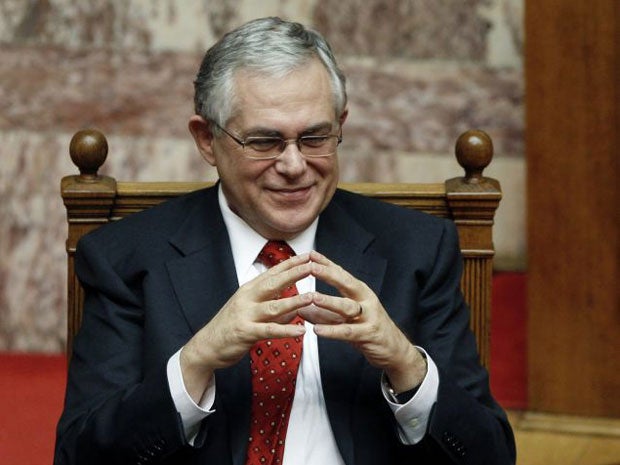Greek PM Lucas Papademos in talks with unions

Greece's prime minister is due to hold talks with labour unions and trade federations ahead of a crucial visit by the country's debt inspectors while Athens negotiates the terms of a second multimillion-euro international bailout.
Lucas Papademos's series of meetings with the main union representing private sector workers, as well as with trade, commerce and enterprise federations, are expected to tackle sensitive issues such as collective wage agreements.
The talks come a day after government spokesman Pantelis Kapsis warned that Greece might have to leave the euro if it fails to finalise the details of the 130 billion (£108.5 billion) bailout and that more austerity measures may be needed.
Debt inspectors from the International Monetary Fund, European Central Bank and European Commission are expected in Athens later this month.
Collectively known as the troika, the inspectors have previously said Greece needs to reduce its labour costs as part of efforts to make the country more competitive.
Greece has been kept solvent by an initial package of 110 billion euro (£91.8 billion) bailout loans, which began being disbursed in May 2010. In return, the government imposed deeply resented austerity measures to contain a bloated budget deficit, including cutting salaries and pensions and introducing repeated tax hikes. The measures have led to frequent and often violent demonstrations over the past two years.
Despite the austerity, it soon became clear that the initial package would not be enough to definitively save Greece from a messy default, and a second rescue package was agreed in October. However, key details of that deal are still being negotiated - most crucially a provision under which private creditors such as banks and investment firms would take a 50% cut in the face value of the Greek bonds they hold.
Greece has been struggling to get private creditors to agree to key aspects of the haircut, which is has to implement ahead of the March 20 maturity date of 14.4 billion euro (£12 billion) worth of bonds. Athens would not be able to make the repayment without the second bailout, while the bond writedown would also reduce and delay the amount that would be due.
The Institute of International Finance, which has been leading the negotiations on the debt restructuring on behalf of Greece's private creditors, said late yesterday that some progress had been made in the discussions in recent days. However, indicating the urgency of finding a solution, the IIF stressed a deal had to be found "in the days ahead".
Negotiating the details of the second bailout and ensuring Greece gets the funds is the main mandate of the temporary coalition government headed by Mr Papademos, a former central banker appointed in November after a political crisis forced the country's socialist prime minister to resign.
Yesterday, Mr Kapsis warned that Greece would be unable to stay in the euro without the new bailout deal.
"This famous loan agreement must be signed, otherwise we are outside the markets, out of the euro and things will become much worse," he told private Skai TV.
Join our commenting forum
Join thought-provoking conversations, follow other Independent readers and see their replies
Comments
Bookmark popover
Removed from bookmarks